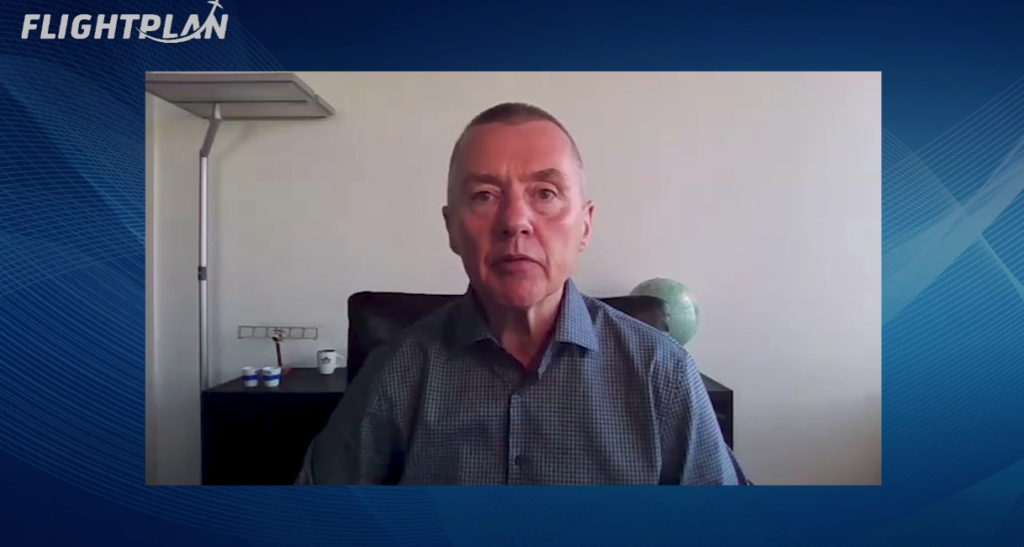FlightPlan III: Why IATA’s Willie Walsh Believes Zero-COVID is Not an Option
Share

Willie Walsh took up the position of Director General at IATA in April, over a year since the initial onset of the COVID-19 pandemic. During the FlightPlan III: C-Suite Week event developed by Inmarsat Aviation and APEX, he spoke candidly with the BBC’s Aaron Heslehurst about how and why the aviation industry has struggled to deal with the fallout of the virus.
During his term as Director General at IATA, Walsh said he is focused on giving the association and the broader aviation industry a “louder voice.” While he acknowledged he’s “never been shy about calling out problems,” he now feels more free to say what airlines can’t, because he’s not dependent on support from the government or shareholders. This attitude made for an eye-opening first session as part of FlightPlan III: C-Suite Week.
When asked whether he thought the industry had learned from previous crises, such as 9/11 and the global financial crisis, in terms of how it approached COVID-19, Walsh said he believed it had, but emphasized that the impact of pandemic was on “a completely different scale.” He explained, “In 2001, industry revenues fell by 6.4% … In 2009, following the collapse of Lehmans, industry revenue fell by 16.5% … In 2020, industry revenues fell by almost 56%.” Walsh called this an “existential” challenge for many airlines, and said they were left with very few choices.
However, he said that in hindsight airline CEOs probably feel they could have dealt with consumers better when it came to refunds. “I think there was a lot of confusion, not all created by the industry. Some external voices that didn’t understand the industry or the consumer rights were telling people they were entitled to refunds, when maybe they weren’t.” But Walsh added, “Everyone did the best they could at the time. Every airline CEO I know was just focused on survival, because this is the worst crisis we’ve ever seen.”
According to Walsh, IATA’s current focus is on “trying to convince governments that they need to look at reopening borders, based on the risk that exists.” Walsh elaborated, “The risk that we’re dealing with today in terms of this virus is completely different to the unknown risk we were dealing with 15 months ago. Governments have tonnes of data available to them now, but are effectively putting in place the same measures as before … We’re not so much dealing with medical and scientific risks, we’re dealing with political views. I think governments are more influenced by the polling.”
Walsh said airlines look at risk differently. “It’s not a static environment, it’s changing all the time, so you reassess to make sure you have the correct measures in place and that you’re dealing with a residual risk that is acceptable. That’s the reason our industry is the safest form of transport, because this is our bread and butter. Governments and politicians don’t like to do this, and so I can understand why they wanted to adopt a zero-risk approach.”
“In 2001, industry revenues fell by 6.4%. In 2009, they fell by 16.5%. In 2020, revenues fell by almost 56%.”
Willie Walsh, IATA
He extrapolated this way of thinking to demonstrate the risk this approach creates in itself: “Are we living in a world where governments decide how we’re going to eliminate risk and you no longer have the opportunity to take a decision yourself? What’s next? Do we ban all smoking because of smoking-related deaths, do we ban all alcohol? All driving?”
Walsh admitted he was also disappointed by the way the European Union interpreted the same data in so many different ways rather than coming up with a coordinated political response. “Post-Brexit, you would have thought it was a great opportunity for the EU to demonstrate to the world that this is a united coordinated block of countries, but that just didn’t happen.”
Although airlines are used to accommodating diverse requirements, he said this has posed a real issue, and is why IATA came up with its Travel Pass solution. “Most airports today are not designed to have every customer that’s flying go to the check-in desk, which is what people were having to do to check all their documents.”
He’s concerned about companies profiteering from testing requirements related to international travel, too. “We looked at the price of PCR tests across 16 countries … We saw prices for the same test ranging from $27 in Kuala Lumpur to $278 in Tokyo.” Walsh mentioned he was surprised consumer rights groups haven’t been more vocal in this space.
Yet despite this raft of challenges, which don’t all have clear solutions coming down the pipe right now, Walsh ended his interview by saying he remained optimistic about the future of air travel. “I think we can do a better job, I think we will do a better job and there is an opportunity to you know learn from everything we’ve gone through and make sure that we do things better going forward,” he concluded.
You can access Willie’s interview and others from the event here.


